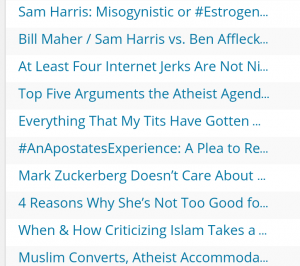When I attempted to start discussion about Facebook’s troubling Real Names Policy, I called my piece “Mark Zuckerberg Hates Ex-Muslims”. I could have called it “Mark Zuckerberg Doesn’t Care About Ex-Muslims” but that’s longer and less provocative. People are far less likely to click on longer and less-provocative titles.
Furthermore, I don’t think my word choice was a misrepresentation. Utterly disregarding the concerns of a group, pompously declaring anyone who can’t use their legal names on Facebook to be “lacking integrity”, and deleting their profiles is hateful, in my view. However, thanks to my choice in title, the discussion was derailed into “but the title is misleading!” debates. In the hopes of a more germane conversation, I changed the title.
I fear that, in appeasing people those who took more issue at my implying a powerful person might be hateful than at the hateful policy he is implementing, I might lessen my impact. Clickbait only exists because it works.
Righteous indignation at “misleading” titles aside, titles that aren’t long and nuanced tend to lead to more people clicking on (and, presumably, reading) a piece. I try to avoid saying anything I can’t defend or that is misleading in terms of my views in a title, but when it’s between “Mark Zuckerberg Hates Ex-Muslims” and “Mark Zuckerberg Doesn’t Care About Ex-Muslims”, the former wins. It invites people to click, and perhaps to read, with its provocation.
We like to claim that we enjoy nuance and abhor “clickbait” and leading headlines, but my site stats say the opposite.
What do you see in my top ten? Names of famous atheists — check. Inflammatory words — check. At least somewhat oversimplified and/or overgeneralized versions of my arguments — check.
Before I started engaging in such titling, I’d watch provocatively-titled pieces mostly comprised of pull-quotes, videos, sarcasm, and admonishments go viral, while my more carefully-written and agonizingly thought-out pieces languished in obscurity.
I want clicks not because I get paid all the mystical internet money for them, but because I want people to read what I write. When I pour a minimum of 2-3 hours into writing and revision every day, is it so bad that I hope that people will care? It’s why I don’t write these things in my private journal. It’s why I bother to link things and explain myself. It’s why I try to be consistent with a posting schedule despite having several other schedules clamoring for my attention.
My estimate of 2-3 hours doesn’t take into account all the conversations I have, reading I do, and contemplation in which I engage to actively feed my writing, mind you.
I do try to not go too far with it, and am open to criticism regarding ones where I may have done so. However, opposing the practice of provocative titling is unfair to those of us who do the labor whose fruits you enjoy (or love to hate, whatever the case might be) nearly entirely for free.
Main image via Mimi & Eunice



I admit to clicking on clickbait, but I don’t respect it. A rather well-known newspaper has lost it’s chance to get a subscription out of me by systematically using clickbaity headlines which barely even reflect the content of the piece. I’m even guilty of reading pieces just enough to find out whether the author believes their headline or not, then dismissing them. And yeah, I usually go to the comments and tell them what I think of their headline, especially it seems like false advertising. Really, I just can’t take people seriously when their title reads like a Daily Mail (revolting British tabloid) front page.
Don’t take this too personally, please. A lot of your posts have had interesting content and I understand the desire to pull in readers, but myeah, this is the effect that has on me.
On the one hand, I want to retain integrity. On the other, I want to expand readership. I don’t want to go the way of Upworthy or The Daily Mail or whatever, but I also don’t want to write dull titles that no one cares about. It is a tough balance I try to strike and, like I said, I welcome feedback.
I hardly think your “clickbait” titles are in the same league of ethical ick as the sidebar stuff on, say, dailydot or wired or even scientific american, In your hands, they feel more like a reasonable provocation. Maybe it’s the fact that your articles are activism that deserves to be read by the highest amount of people, I don’t know. Just my feeling.
“doesn’t care about” works on the Kanye reference. Although the internet seems to have largely forgotten about that hurricane.
I don’t have a problem with the original title of the article(which I thought was great by the way). Even if someone had thought that they were about to read an article proving that Zuckerburg had become an extreme Islamist and was out to get ex-Muslims and were disappointed by the less sensational story, you haven’t cost them any money or taken up much of their time. And the issue you brought up was applicable to anyone concerned with privacy.
The Zuckerberg title is only a bit off because it presents a specific opinion which he doesn’t necessarily have. Ex-Muslims were probably not high on his list of considerations; it seems to be all about the money for him. I don’t think it’s ever a good idea to trust or even take seriously anyone whose viewpoints on integrity can be bought. And that sort of makes me think that clickbait accusations over him are particularly ironic. 🙂
Ugh. Every time I decide I really should get a Facebook page, because so much political stuff I’m interested in goes on there, I read something about Facebook or Zuckerberg that makes me want to puke.